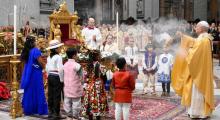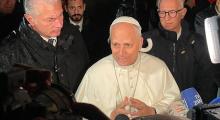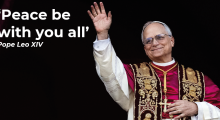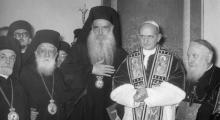Issued by the Catholic Center for Studies and Media - Jordan. Editor-in-chief Fr. Rif'at Bader - موقع أبونا abouna.org
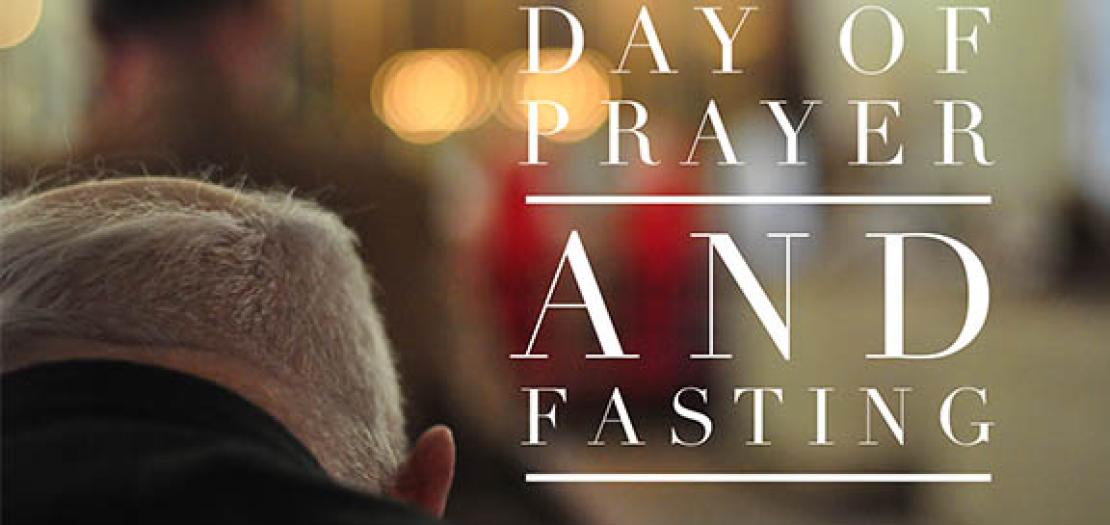
Pope Francis has called for a day of prayer and fasting for on October 7, the one-year anniversary of the outbreak of the Israel-Hamas war.
“In this dramatic hour of our history,” the Pope said, “while the winds of war and the fires of violence continue to devastate entire peoples and nations,” the Christian community is reminded of its call to "put itself at the service of humanity."
The Pope was speaking after Mass in St Peter’s Square for the opening of the second session of the General Assembly of the Synod.
He invited all the synod members to accompany him on a visit to the Basilica of Saint Mary Major on October 6, the day before the anniversary, where, he said, he will “address a heartfelt petition to the Virgin” for peace.
“Let us walk together,” the Pope urged. “Let us listen to the Lord. And let us be led by the breeze of the Spirit.”
Days of fasting and prayer for warzones have been a constant throughout the pontificate of Pope Francis. Not six months after his election, on September 7, 2013, the Pope gathered thousands of people in St. Peter's Square to pray for peace in Syria.
In 2017, he called for prayer and fasting in DRC and South Sudan. In 2020, in the wake of the Beirut Port blast, he urged the same for Lebanon. In 2021, he called for prayer and fasting in Afghanistan, and the next year, in a moving ceremony in St Peter’s, he consecrated Ukraine and Russia to the Immaculate Heart of Mary.
Pope calls for humble and synodal church, led by the Holy Spirit
He began by reminding the participants that the Church is constantly on a journey, one that mirrors the mission God has set before His people since the time of the apostles, stressing that the mission of the Church is to bring peace through the proclamation of Jesus Christ.
Reflecting on the role of the Holy Spirit, the Pope recalled that "the Holy Spirit bends the stubborn heart and will, melts the frozen, warms the chill, and guides the steps that go astray." He emphasized that the Spirit is ever-present, especially in moments of sorrow and despair when humanity is faced with the temptations of hopelessness and division. “The Holy Spirit wipes away our tears and comforts us because he communicates God’s gift of hope," the Holy Father added.
Pope Francis then went on to speak of the humility required to recognize our own need for forgiveness. He referenced the Penitential Vigil that took place Tuesday night, where those gathered experienced the grace of reconciliation. "We put aside our pride and presumption, imagining that we are better than others. Have we in fact become more humble?" he asked.
The Pope then described the transformative power of the Holy Spirit as a fire that kindles love and exultation within us, a love so strong that it would embrace all of humanity without discrimination. "This is because God always embraces everyone," the Pope said, before reminding the Church of the need for constant forgiveness. He urged participants to mirror God’s infinite mercy, inviting them to "always forgive others, since readiness to do so is born of our own experience of having been forgiven."
Speaking then of the synodal process, Pope Francis said that it is not just a momentary event but a continuous journey, one in which the Church learns to better understand herself and discern the most effective ways to carry out her mission. He described the synodal Assembly as a "plural subject," where bishops, laypeople, priests, and consecrated men and women work together in service to God’s mercy.
Highlighting the significance of lay participation in the synodal process, Pope Francis explained that the presence of lay members in the Assembly does not diminish the authority of bishops. Rather, it strengthens the Church’s relational nature, emphasizing the need for collaboration. “No one is saved alone,” the Pope stressed.
Pope Francis also invoked the wisdom of Saint Paul VI, who instituted the Synod of Bishops in 1965. He described the Synod as a process of continual learning, a reflection of the Church’s mission to be renewed by the Holy Spirit and to journey toward the fulfillment of God’s plan. "The synodal process is also a learning process, in the course of which the Church comes to know herself better," the Holy Father explained.
Bringing his address to a close, Pope Francis called for all participants to remain open to the action of the Holy Spirit, who he described as the Church’s “sure guide and comforter.”
“We are making this journey together,” the Pope concluded, “with hope, humility, and trust in the Lord.”


